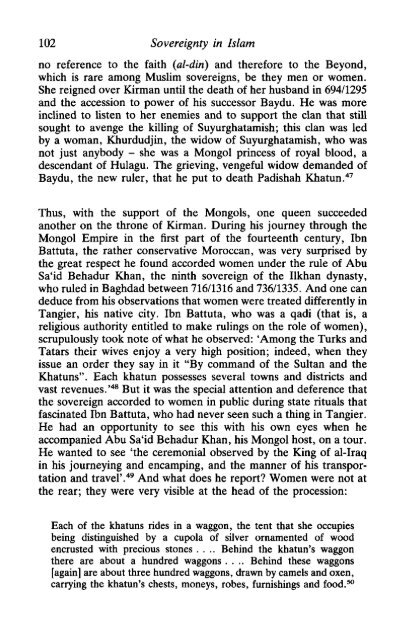Fatima.Mernessi_The-Forgotten-Queens-of-Islam-EN
Fatima.Mernessi_The-Forgotten-Queens-of-Islam-EN
Fatima.Mernessi_The-Forgotten-Queens-of-Islam-EN
Create successful ePaper yourself
Turn your PDF publications into a flip-book with our unique Google optimized e-Paper software.
102 Sovereignty in <strong>Islam</strong><br />
no reference to the faith (al-diri) and therefore to the Beyond,<br />
which is rare among Muslim sovereigns, be they men or women.<br />
She reigned over Kirman until the death <strong>of</strong> her husband in 694/1295<br />
and the accession to power <strong>of</strong> his successor Baydu. He was more<br />
inclined to listen to her enemies and to support the clan that still<br />
sought to avenge the killing <strong>of</strong> Suyurghatamish; this clan was led<br />
by a woman, Khurdudjin, the widow <strong>of</strong> Suyurghatamish, who was<br />
not just anybody - she was a Mongol princess <strong>of</strong> royal blood, a<br />
descendant <strong>of</strong> Hulagu. <strong>The</strong> grieving, vengeful widow demanded <strong>of</strong><br />
Baydu, the new ruler, that he put to death Padishah Khatun. 47<br />
Thus, with the support <strong>of</strong> the Mongols, one queen succeeded<br />
another on the throne <strong>of</strong> Kirman. During his journey through the<br />
Mongol Empire in the first part <strong>of</strong> the fourteenth century, Ibn<br />
Battuta, the rather conservative Moroccan, was very surprised by<br />
the great respect he found accorded women under the rule <strong>of</strong> Abu<br />
Sa'id Behadur Khan, the ninth sovereign <strong>of</strong> the Ilkhan dynasty,<br />
who ruled in Baghdad between 716/1316 and 736/1335. And one can<br />
deduce from his observations that women were treated differently in<br />
Tangier, his native city. Ibn Battuta, who was a qadi (that is, a<br />
religious authority entitled to make rulings on the role <strong>of</strong> women),<br />
scrupulously took note <strong>of</strong> what he observed: 'Among the Turks and<br />
Tatars their wives enjoy a very high position; indeed, when they<br />
issue an order they say in it "By command <strong>of</strong> the Sultan and the<br />
Khatuns". Each khatun possesses several towns and districts and<br />
vast revenues.' 48 But it was the special attention and deference that<br />
the sovereign accorded to women in public during state rituals that<br />
fascinated Ibn Battuta, who had never seen such a thing in Tangier.<br />
He had an opportunity to see this with his own eyes when he<br />
accompanied Abu Sa'id Behadur Khan, his Mongol host, on a tour.<br />
He wanted to see 'the ceremonial observed by the King <strong>of</strong> al-Iraq<br />
in his journeying and encamping, and the manner <strong>of</strong> his transportation<br />
and travel'. 49 And what does he report? Women were not at<br />
the rear; they were very visible at the head <strong>of</strong> the procession:<br />
Each <strong>of</strong> the khatuns rides in a waggon, the tent that she occupies<br />
being distinguished by a cupola <strong>of</strong> silver ornamented <strong>of</strong> wood<br />
encrusted with precious stones .... Behind the khatun's waggon<br />
there are about a hundred waggons .... Behind these waggons<br />
[again] are about three hundred waggons, drawn by camels and oxen,<br />
carrying the khatun's chests, moneys, robes, furnishings and food. 50


